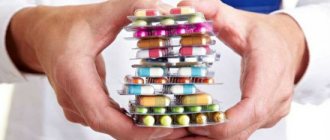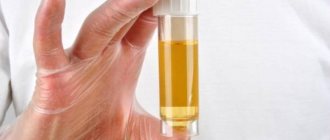Since red urine is common after eating beets, many people wonder how bad it is. In fact, if you eat beets and your urine turns red, this is a completely normal and natural phenomenon for children and adults, the appearance of which is due to the pigments that the product contains. In a situation where the red or pink color does not change to normal for quite a long time, the patient may have a hidden pathology. Eating the root vegetable can change the color of the discharge only once.
Red tint of urine
After eating a healthy vegetable, many people wonder whether beets can cause red urine. This condition occurs quite often and is not considered something special. Betacyanins provide color to urine. They contain several substances with similar chemical structures. The main one is betanin, which determines color saturation. It happens:
In each specific situation, the shade is influenced by the level of stomach acidity, the period of digestion of the vegetable and other factors. Therefore, if your urine turns red after eating beets, this is quite normal, since betancyanins may not decompose. The exact reasons have not been established. Some experts suggest that the culprit is low pH levels in the stomach. The compounds pass through the digestive organs, are absorbed through the intestines and colon, after which they penetrate into the blood, are filtered in the kidneys and are excreted along with urine. Other factors affecting color include:
- Betanin content in food - the type of beet, the addition of canned extract, and the storage conditions of the root crop matter.
- The volume of urine - it affects the concentration of coloring pigments.
- Drinks and foods that contain large amounts of coloring components.
- Medicines that change stomach acidity
Studies have shown that the shade varies, and its change lasts up to two days - it all depends on the volume of water consumed and the amount of vegetable eaten.
Diagnostics
If your urine has been pink for several days after eating beets, you should visit a doctor. To establish the reason why urine is of this color, it is necessary to undergo a set of diagnostic measures, including:
- passing a general urine test, which will help identify an infectious or inflammatory disease in the internal organs, as well as other pathologies;
- taking a biochemical and general blood test to determine the level of hemoglobin and the number of red blood cells per unit of blood;
- performing an ultrasound examination of the abdominal organs if there is a suspicion of diseases of the urinary system or kidneys;
- carrying out other diagnostic studies.
Based on the results obtained, the doctor makes a diagnosis and prescribes the necessary therapy.
Red urine after beets - is this normal?
The root vegetable contains special compounds that make it bright. Even when peeled, the vegetable leaves marks on dishes and hands. After eating beets in small quantities, their pigments are processed and discolored in the stomach. The urine retains its normal color. But if you eat a lot of vegetables or drink little liquid, the concentration of urine increases and its color changes. The red color of urine, which is observed after taking healthy beets, is considered normal if certain conditions are met:
- the duration of the changes is no more than two days,
- urine should be clear and free of impurities,
- the smell remains the same
- there are no other symptoms - pain in the lumbar region, discomfort when urinating, fever.
If your health has not changed, and the pink tint of urine observed after eating beets disappears after some time, we are talking about a small amount of fluid, abuse of beet juice or high acidity of urine. All of these cases are normal and do not require therapy.
What you should pay attention to?
Most doctors still agree with this opinion that urine is usually pink after beets. But in some situations it indicates a problem, especially if you have the following symptoms:
- frequent urination, which gradually intensifies;
- chills and sweating;
- fever;
- pain in the lower back and abdomen;
- strong odor of urine, cloudiness.
Pink urine in women after beets, as well as in men, is considered normal only when the person ate this vegetable before urinating and the liquid is clear. Its cloudiness indicates pathology.
Causes for concern
If a symptom is detected, it is important to understand why the urine turns red after eating beets. Sometimes it signals problems in the body that need to be identified and eliminated.
Imbalance of urine acidity
Even if the urinary system is functioning normally, some of the pigments present in beet juice end up in urine. Normally, they immediately discolor. If you eat a vegetable along with other foods or medications that increase the acid balance of urine, pigment compounds will inevitably color it. When this phenomenon recurs, you should take tests, evaluate their results and, if necessary, adjust your daily diet.
Dysbacteriosis
Another reason why beets color urine is a violation of the microflora in the intestines. In this case, the breakdown processes slow down much, and the breakdown products end up in the kidneys, where they are not able to be completely processed. As a result, coloring pigments from the root vegetable end up in the urine. In this situation, it is recommended to introduce dishes into the menu that have a beneficial effect on the intestinal microflora - fruits, fermented milk drinks, vegetables. Additionally, Probifor, Bifidumbacterin and other similar drugs can be prescribed.
Kidney problems
The cause of urine turning red after eating beets may be malfunction of the kidneys, which occurs against the background of inflammation and other ailments. In this case, the organ removes decay products without processing. To solve the problem, you need to go to the doctor and undergo a comprehensive examination.
A change in the color of urine requires consultation with a specialist and a comprehensive examination.
But usually it’s enough to adjust the menu and change your lifestyle.
Other reasons
Sometimes the urine turns pink not only from beets. The alarm should be raised when a number of symptoms appear:
- severe turbidity of urine,
- pain and burning during bowel movements,
- pain in the bladder or kidney area,
- intoxication – manifested by fever, chills, headache,
- retention or decrease in daily urine volume.
All these signs indicate a pathology affecting the urinary organs. This could be cystitis, kidney stones, pyelonephritis, etc. In a woman, a change in the shade of urine can be caused by gynecological diseases. When blood from the vagina enters the urine, it colors it. In representatives of the stronger sex, urine turns pink due to inflammation or neoplasms that form in the prostate gland. Redness of urine against the background of pathologies is due to the formation of red blood cells in it. In addition to pathologies, the cause of a change in the color of urine can be a lack of vitamins, which cannot be ignored. Any failure should be cause for concern.
Treatment
If the color of urine changes, you should not self-medicate. You should consult a doctor who will prescribe the appropriate diagnosis, and then treatment. If after eating beets the urine turns pink or red, no special treatment is required. However, beet-colored urine can be a sign of various inflammatory and infectious diseases. First of all, the doctor will prescribe a diagnosis for the patient.
Diagnostic methods:
- A general urine test is essential. It is one of the most informative diagnostic methods, helping to detect inflammatory processes and diseases.
- A blood test will be required to determine red blood cells and hemoglobin levels. If a low hemoglobin level is detected, the patient will be prescribed medications.
- In some cases, the doctor may provide a referral for an ultrasound of the kidneys and abdominal cavity. This is done in order to identify diseases of the urinary system.
It is highly not recommended to self-medicate, since red urine is not always a consequence of the effects of diseases, and the patient may harm himself with medications. It is necessary to carefully monitor the color and consistency of the discharge, since the slightest changes in the color, smell or consistency of urine can be a sign of the impact of the disease. A timely visit to a doctor will help to avoid the development of many complications, as well as begin treatment at an early stage of the disease.
To conduct the experiment, you will need vinegar, soda and collected urine. You need to add a little soda to the urine, then add a drop of vinegar. If the color of the liquid disappeared after adding soda, but reappeared after adding vinegar, then you should not worry. The coloring of urine was due to exposure to pigment. However, in any case, it is extremely necessary to visit your doctor, because The test performed does not have a high level of reliability.
https://www.youtube.com/watch?v=hENrXNmUQtQ
There are also traditional methods of prevention. They include frequent visits to the bathhouse and sauna. It is necessary to use kidney collection, various teas with the addition of linden, honey and raspberries, you can also use a white root vegetable similar to radish. It is also necessary to avoid hypothermia, as this has a detrimental effect on kidney health. However, if your urine does not change color, you should visit a doctor.
In addition to folk remedies for prevention, you should use medications prescribed by your doctor. Drugs prescribed for antibacterial therapy:
- Urolesan is a medication designed to remove kidney stones and relieve pain. The drug is also anti-inflammatory.
- Furagin, like urolesan, has anti-inflammatory and antibacterial effects. Helps the name system cope with the disease.
The urine color may change to red due to the effects of betanin. Betanin is a pigment found in beets. However, to be sure of the exact cause of red urine, you need to visit your doctor, who will prescribe the appropriate course of treatment and diagnosis.
If the color of urine changes, you should not self-medicate. When the cause is beets, no therapy is carried out. But sometimes staining indicates the development of inflammation and infectious diseases. A set of tests will help determine them. At home, you can independently determine why your urine has changed color.
There are several folk recipes for prevention. They include regular visits to the bathhouse or sauna, consumption of kidney infusions, tea with the addition of linden, honey and raspberries. Hypothermia should also be avoided, as it worsens kidney health. If the color of the urine does not change, qualified medical assistance will be required. The following drugs are prescribed for antibacterial therapy:
- Urolesan – ensures the removal of kidney stones and relieves pain.
- Furagin – has an anti-inflammatory effect, increases the body’s immune forces.
If there is a persistent change in the color of urine, you should talk to a specialist, since urine can be colored not only by beets.
Beetroot as a reason
In the absence of additional symptoms and discomfort, you need to reconsider your diet and remember if you have eaten beets. Usually, coloring of urine is observed after eating a raw vegetable, especially if it is beet juice. The root vegetable has good taste, so many people include it in their diet without thinking about whether beets affect the color of urine. It contains a lot of useful elements, so it is recommended to eat it as part of a diet.
Frequently eating raw vegetables can cause permanent red urine, but it is worth remembering about diseases. It is advisable to give up root vegetables for a while and observe the dynamics. If the pink tint persists, you should urgently see a specialist.
Does it change equally or not in children and adults - what is the difference?
Can a child develop color, does this happen?
Beets are useful not only for adults, but also for children. It has a good effect on the functioning of the gastrointestinal tract. This vegetable is given to young children after heat treatment and in the form of puree.
It is not recommended to give raw beet juice to children. It can cause irritation of the gastrointestinal tract, but boiled, on the contrary, promotes good peristalsis.
Can a root vegetable stain an adult's urine? For adults, the raw product is absolutely safe. A child's body is different from an adult's. In children, urine staining occurs in almost one hundred percent of cases. A child's filtration system continues to develop with age, so it is not perfect in the early stages. That is why pigments are excreted from the child’s body unchanged.
Urine is intensely colored. Parents need to know that if a child has a change in the color of urine, then contacting a doctor should be mandatory.
Beets are famous for their beneficial effects on the functioning of the intestines and the entire body as a whole.
In its raw form or in the form of freshly squeezed juice, only adults can consume the root vegetable to avoid negative effects on the baby’s gastrointestinal tract. However, the presence of even boiled beets in a child’s diet is welcome.
But a child’s body is somewhat different from an adult’s, so for many children, eating beets affects not only the color of stool, but also the color of urine. Seeing that the child’s urine has acquired a pink or reddish tint after eating beets, most parents panic. Although the systems of the child’s body are not yet fully formed (many of them continue to form until the age of 14-16), and it is for this reason that pigments from beet juice can be massively excreted along with urine, which is why urine is colored.
But in the case of a child, it is still better to play it safe and if you see urine with a reddish tint, be sure to contact a pediatrician or pediatric urologist. The doctor will first prescribe a general urine test, which in this situation will be one of the most accessible and informative diagnostic measures.
Which doctor should I contact if I suspect a problem?
If the unusual color of urine causes concern, you should make an appointment with a urologist to eliminate the possibility of internal bleeding and other threats to human health.
Before submitting your urine for testing, you should refrain for two to three days from eating foods containing coloring pigments - beets, carrots, and various berries.










